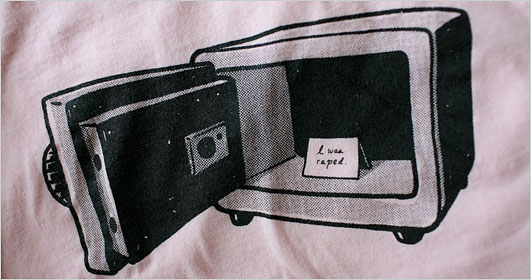Excerpt: We have privatized victimhood and are now privatizing criminalization.

Jennifer Baumgardner, otherwise known as the woman who came up with the “I had an abortion” T-shirt, recently unveiled her latest creation. This time, her T-shirt’s image is of an open safe, with the words “I was raped” delicately scrawled across a note. (April is Sexual Assault Awareness Month.) The message is obvious: Rape is a secret for too many people and they need to open up about it. According to Baumgardner, the shirt allows victims “to own that experience and divest themselves of some of the shame and secrecy of it—and realize that they’re not the ones that should be ashamed.”
We could argue about whether or not rape is still a deeply shameful experience. That’s not an unimportant question, but focusing on whether or not our cultural and legal attitudes towards rape have changed only blinds us to the fact that the T-shirt renders rape in terms of affect and understanding. It does nothing more than ask for pity for the wearer who has carried the burden of a secret.
By focusing on rape as an intensely privatized experience, we miss the fact that rape is a tool of political and economic coercion, mostly suffered by bodies with neither the resources nor the inclination to wear their experiences on T-shirts. In a time of war, rape is the first weapon of dominance visited upon the conquered. But this use of rape is hardly restricted to war zones.
Take, for instance, the issue of prisoner rape. According to the Bureau of Justice, as noted by the group Stop Prisoner Rape (SPR), “more than 6, 500 inmates in adult prisons filed reports of sexual violence in 2006 alone.” A significant portion of these are youth and/or LGBTQ youth.
There is, of course, a danger that drawing such distinctions creates hierarchies of opprerssion. Even if the people raped in prison are criminals who had themselves raped others, we shouldn’t classify them as deserving victims of rape. And yet, we’ve grown indifferent to and naturalized the fact that prison rape has become a de facto method of maintaining control over inmates who will probably spend their entire lives in prison because of draconian sentencing laws that inflict longer sentences for even minor crimes. They will always live within the informal and brutal sexual economy of prison time.
In short, rape has become the unacknowledged weapon of choice within mechanisms of war and systems of incarceration. The text and imagery of the rape T-shirt separates the act from the political and economic realities in which it occurs.
And what are we to do with those among us who wear these T-shirts to announce their experiences? If someone has to wear a T-shirt to “own” an experience, that’s a sign he or she lacks access to professionalized care. Let’s not kid ourselves that all we need to do hold hands with each other in order to help victims of rape. People respond differently to different forms of sexual assault and need different kinds of help. Are we to collectively take rape-counseling classes to help the wearers cope?
The T-shirt proves that the personal is not political. Instead, the personal now stands in for the political. People who are raped don’t need another T-shirt. They need medical care—free and easily accessible—that helps them to deal with the physical harm they’ve endured. They need a system of justice that doesn’t criminalize them, and lawyers to help them through the system.
Instead, the T-shirt puts the onus upon the wearer to create a system of ‘ownership’ and recovery. It also creates an emotional climate around rape, the sort that furthers the notion that we not only know how to help the victims, but how to punish the criminals. It’s no surprise that there’s also a T-shirt that declares, “Dead men don’t rape.” We have privatized victimhood and are now privatizing criminalization.
Ultimately, the T-shirt creates a shamanistic aura around the raped, assuming that they have privileged access to experience. It operates on the assumption that nothing that the non-raped might say to grapple with the complexities of rape can equal the wearer’s rape.
Let me put it this way: If I told you that I was raped, would you read this column differently? Would you be more or less willing to validate my critique and analysis? Why?
Image of t-shirt design by Vinnie Angel.
Originally published in Windy City Times, 23 April, 2008

Don’t plagiarise any of this, in any way. I have used legal resources to punish and prevent plagiarism, and I am ruthless and persistent. I make a point of citing people and publications all the time: it’s not that hard to mention me in your work, and to refuse to do so and simply assimilate my work is plagiarism. You don’t have to agree with me to cite me properly; be an ethical grownup, and don’t make excuses for your plagiarism. Read and memorise “On Plagiarism.” There’s more forthcoming, as I point out in “The Plagiarism Papers.” If you’d like to support me, please donate and/or subscribe, or get me something from my wish list. Thank you.